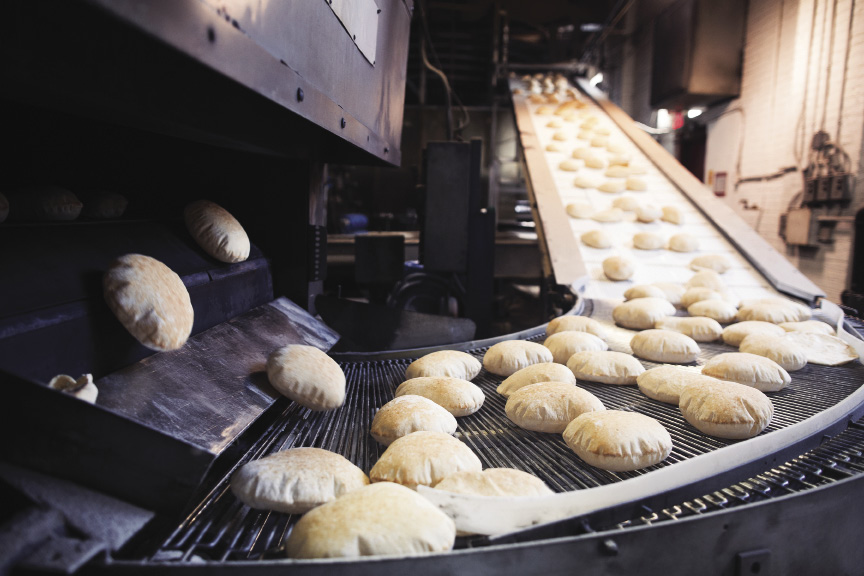DUMBO—The corner of Gold and Water Streets does not demand attention. There are no luxury condos, no art galleries or historic captain’s houses. Smorgasburg is nearly a mile away. Tow trucks bound for the Navy Yard rattle past in the daytime, and at night diners headed for Vinegar Hill House pick their way in the darkness over the uneven cobblestones.
No one suspects that inside the unassuming, one-story building at 56 Gold Street, something wonderful is happening, around the clock.
But there is one clue to the secret life of the corner of Gold and Water Streets, and it is the singular perfume that hovers in the air there: the smell of freshly baked pita bread.
The Damascus Bakery has been headquartered at 56 Gold Street since 1979, but third-generation baker and co-owner Edward Mafoud is quick to note they have been making pita in Brooklyn since 1930. That was the year Mafoud’s maternal grandfather, Damascus native Hassan Halaby, began selling “Syrian bread” on Atlantic Avenue to meet the demand of an increasing population of Brooklynites who—like him—had emigrated from Syria or Lebanon.
But as Brooklyn changed over time, Hassan Halaby—and later, his American-born, Lebanese son-in-law, father to Edward and his brother and co-owner, David—found that the market for their whole-grain, slightly fermented flatbreads did, too. The “health-conscious 1970s—Dr. Pritikin!” Mafoud recalls with a smile—lured a new audience to Atlantic Avenue, as did the rise of falafel and souvlaki shops, the rock stars of pocket-pita cuisine.
In fact, the legendary Mamoun’s, beloved of generations of famished NYU students, has used Damascus Bakery pita since they opened their first falafel joint on MacDougal Street in 1971. Mamoun Chater, the founder, is a Damascus native, too.
Think you’ve heard this story before? You might be mistaken. Because Damascus is not, in fact, the hidden, handmade bread shop that time forgot. It is, instead, a global company, cited by the Bloomberg administration as a mainstay of the Navy Yard industrial district, which was not always a high-rent corridor. Edward and David Mafoud recently branched out across the Hudson River, too, with a $20 million research and development facility in Newark, thanks in part to a multimillion-dollar package of incentives and loans from the New Jersey Economic Development Authority.
From Brooklyn and Newark, Damascus Bakery ships pita, lavash wraps, flatbreads and panini to food service companies and distributors around the globe. They also supply what Edward Mafoud calls “signature” breads (custom wraps, pizza crusts and panini made with custom ingredients) to an international list of clients that he acknowledges is definitely “eclectic”: Pita Grill, Costco, Chick-fil-A, Olive Garden and Starbucks, just to name a few. That spinach, feta and egg-white wrap you’re nibbling with your Venti Blonde at LAX was born in Brooklyn, baby.
“Eclectic,” or perhaps “cosmopolitan,” also describes the diverse range of New York markets that carry Damascus breads: from the original Damascus Bread and Pastry Shop on Atlantic Avenue (owned by the Mafouds’ cousin Dennis Halaby) to Key Food to Gourmet Garage to the Vinegar Factory. And it is this cosmopolitan approach that is the hallmark of the Mafouds’ operation in the 21st century. They are not as interested in capturing the Bedford Cheese Shop demographic as they are in demonstrating that a family-run company can satisfy what Edward Mafoud refers to as a “public need” for consistently delicious and healthful breads.
To meet that need, they operate a 24-hour pita factory that would delight Rube Goldberg: Behind the doors of the former truck depot is a state-of-the-art, fully automated bakery, a battery of planetary mixers, die cutters (to achieve those perfect pita rounds), roller dockers (to dimple flatbreads so they won’t puff up) and ovens that looks to the uninitiated like a Wonka Factory of bread.
Passing through a plastic curtain, I met an even more intoxicating hit of the yeasty perfume out on Gold Street, as well as the sound of bouncy pop, playing at a gentle volume. Visible through a fine, floury haze is a mountain of enormous bags of unbleached, unbromated whole-wheat flour from Snavely’s, a 138-year-old mill in Lancaster County.
In the distance, three gleaming mixers each seem to stand two stories tall. Mafoud explains that the San Cassiano dough kneaders hail from Roddi d’Alba, in the Barolo region of Italy, while his ovens, which can cook a batch of flatbread in 20 seconds, are of German extraction. The baking staff is even more international than their equipment, with Haiti, Mali, Senegal, Mexico and France represented in the work force on any given shift.
Notable among them is a dignified older man named Herman who is observing the packers as they bag, seal and box flatbreads that will be flash-frozen and mailed to a Starbucks distribution center for destiny as wraps.
“He’s worked at Damascus with three generations of my family,” Edward Mafoud notes. “We call him the Sergeant Major, and he has free rein here. Without good people, all the technology in the world means absolutely nothing.”
What does have meaning for the Mafouds, as Edward’s words make clear, is history. As third-generation stewards of Damascus Bakery, they are deliberate, even pragmatic about the changes and innovations that they introduce to their product line in order to maintain its popularity and market share. These changes can be matters of simple geometry, such as cutting their unleavened lavash bread into rounds, rather than the traditional enormous sheets. The rounds are easier to use in wraps—or to tear in half and lightly toast, which gives the bread an addictive, caramelized flavor, no butter required.
But they have also recently rolled out a line of low-carb, high-protein lavash “roll-ups” infused with contemporary flavors such as flaxseed, sundried tomato and even granola that might seem at odds with the ancient simplicity of flour, salt, yeast and water. Edward Mafoud, who is an ultramarathoner, disagrees: His family sees these nutrient-dense breads as the pita of the 21st century, and considers the new product line as much a response to the demands of educated consumers as was his grandfather’s “Syrian bread” on Atlantic Avenue, 83 years ago. The history, he argues, lies in the consistent quality: “taste, texture and fermentation.”
Damascus Bakery is thinking about other ways to leaven history for the modern table. As the Newark facility takes on more production responsibilities, the Mafouds are considering the transformation of part of their Brooklyn headquarters into a product incubator and retail shopping center, along the lines of Chelsea Market—which would certainly change the energy at that intersection. In the meantime, the family has embraced social media as a way to spread the gospel of good bread—a creed which sometimes, poignantly, speaks to the beauty and culture of their besieged homelands. One recent post, written by Edward and David’s sister, Janet, quotes the philosopher and artist Khalil Gibran:
“Work is love made visible…. For if you bake bread with indifference you bake a bitter bread that feeds but half man’s hunger.” There is no indifference on Gold Street.
Photo credit: Elizabeth Leitzell.
Can’t get enough of Damascus bakery? Check out our behind the scenes photos and video.



